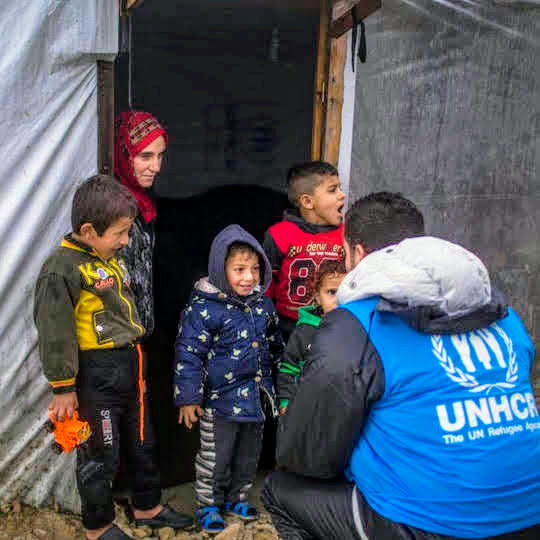Vulnerability Assessment of Syrian Refugees - 2016
Lebanon, 2016 - 2017
Get MicrodataIdentification
UNHCR_LBN_2016_VASYRv2.1
Vulnerability Assessment of Syrian Refugees - 2016
| Name | Country code |
|---|---|
| Lebanon | LBN |
The 2016 Vulnerability Assessment of Syrian Refugees (VASyR) surveyed a representative sample of Syrian refugee households in Lebanon to identify changes and trends in their situation. The assessment to provided valuable insight into refugees living conditions, from the size of their families to the shelter they live in, to their economic vulnerability and food insecurity. Throughout this report, refugees own viewpoints offer a crucial glimpse into the strategies they deploy to survive and their own perceptions of their situation and the assistance they receive. A total of 4596 households were surveyed.
Since its inception, the VASyR has been an essential process and partnership for shaping planning decisions and programme design. It is the cornerstone for support and intervention in Lebanon. As in previous years, humanitarian agencies have incorporated VASyR findings into their programming and recommendations.
The assessment, jointly issued by the United Nations High Commissioner for Refugees (UNHCR), the United Nations Children Fund (UNICEF) and the World Food Programme (WFP, dataviz.vam.wfp.org), demonstrates that economic vulnerability is, at best, as serious as previous year. Over one third of refugees are moderately to severely food insecure, an increase compared to 2015. Families have exhausted their limited resources, and are having to adapt to survive on the bare minimum. Refugees continue to rely on harmful coping mechanisms to get by.
Household and individual.
Version
v2.1: Edited, cleaned and anonymised data.
Scope
The scope includes:
- key indicators on household demographics
- safety and security
- accomodation
- health
- food security
- livelihoods
- expenditures
- food consumption
- debt
- coping strategies and assistance
- intention to return
- education
| Topic |
|---|
| Health and Nutrition |
| Health |
| Water Sanitation Hygiene |
| Food security |
| Community Services |
| Education |
| Livelihood & Social cohesion |
Producers and sponsors
| Name |
|---|
| UNHCR |
| UNICEF |
| WFP |
Sampling
A two-stage cluster sampling methodology was utilized. The population was stratified by district and governorate in order to obtain representative information at both geographical levels.
To ensure geographical representativeness, 30 clusters were selected per district following a random methodology proportional to refugee population size. In each cluster, six randomly selected households were visited. In order to have representative information at the governorate level, additional clusters were selected in Beirut and Akkar, which are the only districts that are also governorates. All other governorates had more than one district to sample.
Weights were assigned to each cluster group according to the population of refugees registered in the region and country. The weighting system was used to compensate for the unequal probabilities of a household being included in the sample.
Survey instrument
The questionnaire included key information on household demographics, arrival profile, registration, protection, shelter, WASH, assets, health, education, security, livelihoods, expenditures, food consumption, coping strategies, debts and assistance, as well as infant and young feeding practices.
Data collection
| Start | End |
|---|---|
| 2016-05-23 | 2017-06-04 |
| Name |
|---|
| Agence d'Aide a la Cooperation Technique et au Developpement |
| Beyond |
| CARE |
| Caritas |
| Intersos |
| International Rescue Committee |
| Makhzoumi Foundation |
| Premiere Urgence Aide Medicale Internationale |
| Save the Children |
| Social, Humanitarian, Economical Intervention for Local Development |
| Solidarites International |
| World Vision International |
The data was collected between May 23 and June 4, 2016, by 170 enumerators and 12 supervisors. Each supervisor was responsible for six teams on average. Data collection was monitored centrally by the information management unit to ensure all clusters were visited and in accordance with the plan. The data collected was registered by electronic devices using Open Data Kit (ODK) software and uploaded automatically on UNHCRs Refugee Assistance Information System (RAIS) platform. Teams made appointments with the interviewees the day before the visit in order to reduce the risk of preparation by the household prior to the visit and therefore minimize bias.
Data processing
Data was edited and anonymised with local suppression and recoding. Few observations were removed because of their higher risk of identification.
Data Access
UNHCR, WFP, UNICEF (2016) Vulnerability Assessment of Syrian Refugees in Lebanon, UNHCR microdata library, https://microdata.unhcr.org
Contacts
| Name | Affiliation | |
|---|---|---|
| Curation team | UNHCR | microdata@unhcr.org |
Metadata production
UNHCR_LBN_2016_VASYR_DDI_v1.0
| Name |
|---|
| UNHCR |
